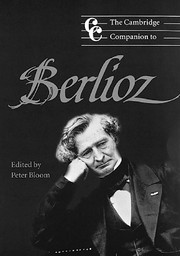Book contents
- Frontmatter
- Introduction: Berlioz on the eve of the bicentenary
- Part I Perspectives
- Part II Principal compositions
- Part III Major writings
- 9 The Mémoires
- 10 The short stories
- 11 The criticism
- 12 The Grand Traité d'instrumentation
- Part IV Execution
- Part V Critical encounters
- Part VI Renown
- Notes
- Bibliography
- Index
9 - The Mémoires
from Part III - Major writings
Published online by Cambridge University Press: 28 September 2011
- Frontmatter
- Introduction: Berlioz on the eve of the bicentenary
- Part I Perspectives
- Part II Principal compositions
- Part III Major writings
- 9 The Mémoires
- 10 The short stories
- 11 The criticism
- 12 The Grand Traité d'instrumentation
- Part IV Execution
- Part V Critical encounters
- Part VI Renown
- Notes
- Bibliography
- Index
Summary
Many celebrated authors, Rousseau and Chateaubriand among them, have written memoirs that became the crowning achievements of their literary careers. But such achievements have been rare among musicians, and it is surely Berlioz who gives us the first great example. Grétry preceded him, of course, by beginning to bring out memoirs (while he was still living) in 1791. Berlioz probably knew this book – an amalgamation of biographical matters and technical details – but his musical and literary skills were frankly superior to Grétry's. One of Berlioz's heroes, Carl Maria von Weber, also wrote a somewhat autobiographical novel, but Berlioz, though probably aware of its existence, could not have read the whole text, which was published only in German. So Berlioz was a pioneer, and a rather unique one at that, for most composers, when they felt the need to express something, usually expressed it in music. How is it that Berlioz did so in writing?
For this to have come about, it was surely necessary that Berlioz not be one of those children who, from earliest childhood, are destined for music either by family tradition or by recognition of extraordinary skill, and who are thus encouraged first and foremost to develop their musical talents at the expense of all others – something that, for such individuals, usually leads to underdeveloped literary skills and ineptitude in confronting the written word. Berlioz – son of a doctor, recipient of a bachelor's degree, medical student, and, from the moment of his arrival in Paris, companion to young people literally starved for literature – was in no way devoted solely to the cult of music.
- Type
- Chapter
- Information
- The Cambridge Companion to Berlioz , pp. 125 - 145Publisher: Cambridge University PressPrint publication year: 2000

